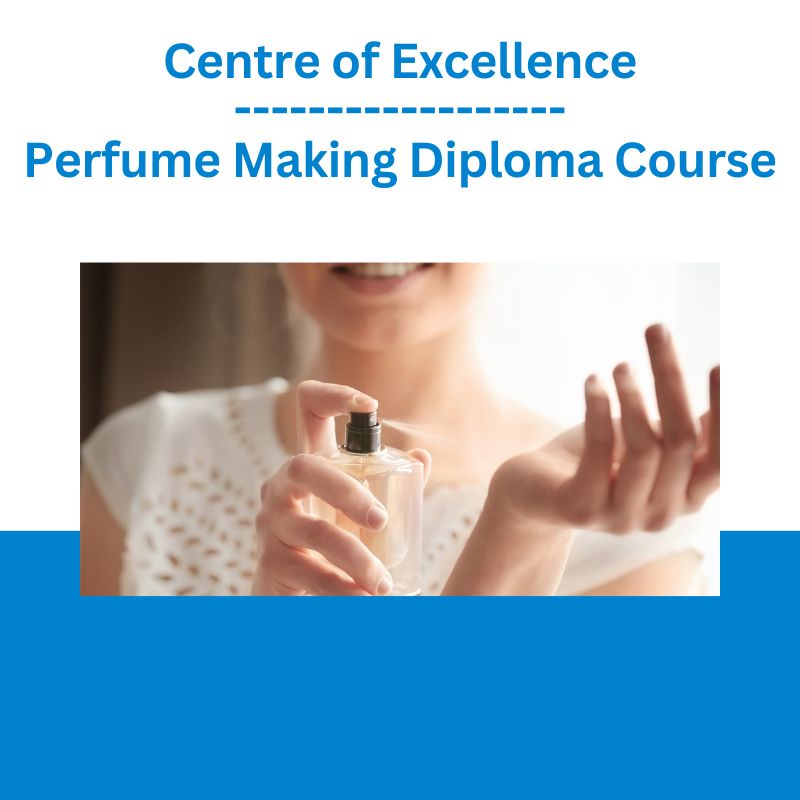*** Proof of Product ***
Exploring the Essential Features of “Centre of Excellence – Perfume Making Diploma Course”
What Will You Learn?
An art and a business that crosses continents and cultures, perfume making and the use of fragrance is thousands of years old. Although estimates of the worldwide perfume industry vary, most experts agree that it is worth £20-40 billion annually and it’s expected to grow by 3-5% yearly for the next decade.
From fragrance families to formulation, the Perfume Making Diploma Course will deepen your understanding of fragrance creation and classification, its significance in history and culture, and how to improve your sense of smell and ability to describe scents using appropriate terminology.
Discover the perfume industry’s key concepts, a brief history of perfume from antiquity to the modern day, some of the most important perfumes, and how different cultures approached fragrances throughout time.
Explore the basics of olfaction (the act of smelling), how to develop your sense of smell, and the basic science of perfume making – including a look at distillation and extraction, along with more technical modern methods.
Follow a step-by-step guide covering the basics of how fragrances are made, what a perfume formulation is, how one is produced, and how combining different aromatics creates a perfume blend.
From there, we’ll explore the four fragrance families of the fragrance wheel – floral, oriental, woody, and fresh – and the sub-genres of each.
You’ll learn to identify accords in perfume, practice developing a complete perfume formulation, improve your ability to research and refine perfume formulations, and discover some of the main new trends in perfumery, as well as how to create solid and alcohol-free perfumes.
By studying this course, you will:
- Become familiar with the history of perfumery and cultural fragrance traditions
- Understand perfume classification, categorisation, families, and materials
- Be able to describe perfumes with appropriate terminology
- Deepen your understanding of the olfactory system and develop your sense of smell
- Be able to assess how the chemistry involved in perfume-making affects scent
- Understand the key steps in making perfume from both synthetic and natural materials
- Become familiar with the four fragrance families and the sub-genres of each
- Learn the main steps taken in commercial perfume making, from formulation composition to marketing
Course Syllabus
What will I learn on the course?
Module 1: Overview and History
Introduction
Part 1: Introduction to the Perfume Industry
Part 2: Fragrance in Antiquity
Part 3: European Scents from the Middle Ages to the 1900s
Part 4: Perfume Trends in the 20th Century
Test Your Knowledge
Key Learning Points Exercise
Module 1 Assessment
Module 2: Fragrance Worldwide
Part 1: Perfume Terminology
Part 2: Fragrance in France
Part 3: Fragrance in Japan
Part 4: Fragrance in India
Part 5: Fragrance in America
Test Your Knowledge
Key Learning Points Exercise
Module 2 Assessment
Module 3: The Sense of Smell
Part 1: 10 Basic Odours
Part 2: How Smell Works
Part 3: Fragrance Categories
Part 4: Describing Smell
Part 5: Refining Your Sense of Smell
Test Your Knowledge
Key Learning Points Exercise
Module 3 Assessment
Module 4: The Chemistry of Perfume
Part 1: Raw Materials
Part 2: Scent Variation
Part 3: Synthetic Aromas
Part 4: Solvents
Part 5: Fixatives
Part 6: Perfume Chemistry Case Studies
Test Your Knowledge
Key Learning Points Exercise
Module 4 Assessment
Module 5: A Step-by-Step Guide to Making Perfume
Part 1: Perfume-Making Steps
Part 2: Perfume-Making Tools
Part 3: Perfume-Making Ingredients
Part 4: Making Dilutions
Part 5: Blending and Accords
Part 6: Creating Perfume Formulations
Part 7: Perfume Regulation
Test Your Knowledge
Key Learning Points Exercise
Module 5 Assessment
Module 6: Making Accords
Part 1: Required Equipment and Raw Materials
Part 2: Creating Harmonious Accords
Part 3: Creating Balanced Accords
Part 4: Abstract Accord Case Study: Amber
Test Your Knowledge
Key Learning Points Exercise
Module 6 Assessment
Module 7: Floral Fragrances
Part 1: Floral Scents
Part 2: White Flowers
Part 3: Soft Floral: Powdery Flowers
Part 4: Floral Orientals and Floral Aldehydes
Part 5: Fruity Florals
Test Your Knowledge
Key Learning Points Exercise
Module 7 Assessment
Module 8: Oriental Fragrances
Part 1: Oriental Scents
Part 2: Spicy Oriental
Part 3: Woody Oriental
Part 4: Gourmand Oriental
Test Your Knowledge
Key Learning Points Exercise
Module 8 Assessment
Module 9: Woody Fragrances
Part 1: Woody Scents
Part 2: Woody Oriental
Part 3: Mossy Woods
Part 4: Dry Woods
Test Your Knowledge
Key Learning Points Exercise
Module 9 Assessment
Module 10: Fresh Fragrances and New Trends
Part 1: Fresh Scents
Part 2: Fresh Citrus
Part 3: Fresh Green
Part 4: Fresh Water
Part 5: New Trends in the Perfume Industry
Part 6: Making Alcohol-Free and Solid Perfumes
Test Your Knowledge
Key Learning Points Exercise
Conclusion
Module 10 Assessment
Who Would Benefit from This Course?
Amateur perfumers who want to develop their foundational knowledge and ability will love the course, as will newcomers to the subject, anyone who’d like to develop a deeper understanding and appreciation of perfume, and those who craft scented products and would like to gain a better understanding of fragrance composition.
Please see the full list of alternative group-buy courses available here: https://lunacourse.com/shop/









